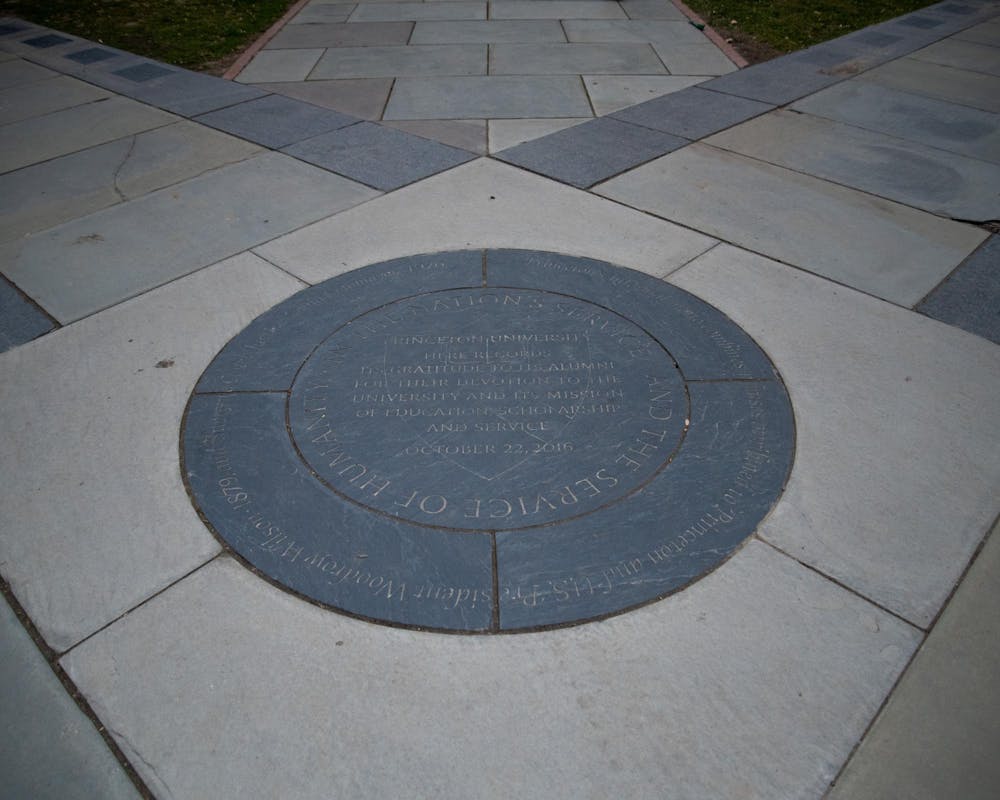There is arguably no phrase more penned in this paper than Princeton’s informal motto, “In the Nation’s Service and the Service of Humanity.” Last semester, eight separate opinions mentioned it — 14 if you count those published over the summer. It is obvious that Princetonians care about this phrase; it is etched in a medallion on the course from FitzRandolph Gate to Nassau Hall. But we can’t seem to agree on what it means.
Criticism of the informal motto is not new. Arnav Vyas ’27 argued in the Tory that “service of the nation and humanity” is too superficial a call, and that without a stronger ethical foundation, “each individual is forced to determine what the good is” that orients their service. This criticism has appeared in the ‘Prince’ as well. This past fall, Managing Editor Lucia Wetherill rightly warned against reducing public service to just “not consulting.” Columnist Anais Mobarak flatly rejected the preeminence service takes over other values, like individual liberty, asking whether “working for the U.S. government” may be antithetical “to being in the service of humanity” because of its past poor choices. And Public Editor Abigail Rabieh aptly recognized last semester that when service is unclear or merely important in name, we risk eschewing the values of humanity and embracing “apathy and moral ambivalence.”
Every one of these perspectives is onto something. There is something hollow about “In the Nation’s Service and the Service of Humanity.” For as much as Princetonians pride themselves on their commitment to service of the nation and humanity, as a group, they much prefer to proselytize than practice it. But the problem is not that the motto isn’t specific enough — it’s that the motto is inherently contradictory.
The values that lead you to serve your country are not the same as the values that lead you to serve humanity. Princeton’s full unofficial motto falters in its challenge to simultaneously present a university in both “the Nation’s Service” and in “the Service of Humanity.” Such a tension is irreconcilable; work done in “the Nation’s Service” necessarily precludes work done in the “Service of Humanity.”
How could fidelity to the rigid borders, history, and politics of one particular nation possibly further all of humanity, especially when so much of the weight of a single nation is constantly morally marred by its problems?
Just as rallying behind the furthering of social welfare and altruistic technological innovation may be pursuits done in “the Nation’s Service,” so is working in the jobs that create the technologies responsible for some of the United States’ darkest offenses. While extreme, this reality highlights the question Princetonians must ask when reading our motto: Does serving the nation necessarily serve humanity? If the answer is no, the University is failing Princetonians by asking them to pick which is more important, the nation or humanity.
So it’s time to get rid of the current construction of the informal motto. To be clear, I am not suggesting — as has been argued — this criticism of “In the Nation’s Service and the Service of Humanity” means we renew our interest in Princeton’s official motto: Dei Sub Numine Viget (“Under God’s Power She Flourishes”).
History is important, but — as President Christopher Eisgruber '83 explained at the most recent recasting of Princeton’s informal motto — it is naive to view tradition as a fixed object of adoration, rather than as a projection or trajectory of what the University is, was, and will be. Tradition does not require blind submission and the official motto is no exception to this.
But just as tradition doesn’t require blind submission to the official motto, which is overly preoccupied with the “faith of [Princeton’s] Presbyterian founders” and is anachronistic with Princeton’s self proclaimed purposes of a modern university, it also does not require submission to the part of the unofficial model that we have moved past.
A university that is “In the Nation’s Service” requires far too great a moral dissonance to be a reasonable inclusion in our motto. When Supreme Court Justice Sonia Sotomayor ’76 suggested adding “the service of humanity” to our motto, she intended to recognize the unique way “everyone can approach their daily work with a passion for making a difference,” regardless of their occupation. It also introduced a value higher than service to the United States: service to all people, all around the world. The addition highlighted the responsibility Princetonians have to “serve people, not just institutions.”
Like the lions that preceded the tigers outside Nassau Hall, the time to keep “In the Nation’s Service” has passed. Princeton should pick humanity. Our new official motto should be: “In the Service of Humanity.”
Christofer Robles is the Community Opinion Editor and is concentrating in comparative literature. He can be reached at cdrobles[at]princeton.edu or at cdjrobles on ‘X.’









